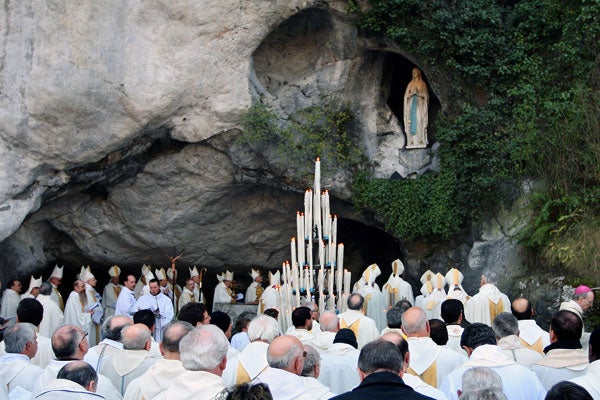Jubilate, By Michael Arditti

Jubilate (pronounced yoo-be-la-ta) is, according to Chambers' Dictionary, the Latin exhortation to rejoice or exult: the opening word of the 100th Psalm (in the Vulgate). According to Michael Arditti: "It just sounded like a good title for a pilgrimage". For a novelist born with Jewish origins and educated at a Methodist boarding school, there appears to be no compelling reason why Arditti should have chosen a Catholic crise de conscience as the subject of this holy visit to Lourdes. Or why he should have used a female narrative voice for the pilgrim, alternating with a (male) TV film director who is shooting a worthy God-slot from a strictly agnostic angle.
Interwoven narrators match interwoven dates. The five days of the Lourdes pilgrimage are taken out of sequence in order that the reader may better understand the impact of a late and unanticipated romance. The pilgrimage is thus related forwards in the words of Vincent, and in reverse by Gillian. For her the intensity of their affair is the more forceful, following years of barren marriage. From an inveterate cheat, her husband (Richard) was, due to a brain haemorrhage, transformed into a lecherous child. Gillian and her mother-in-law (Patricia) are seeking a fresh transformation to allow their lives to move forward.
Arditti soon cuts to the chase. It is the nature rather than the power of miracles he wishes to explore. It is, of course, not Richard who needs to change, but all those around him who, having made what they consider the necessary sacrifice of assuming the burden of his case, review their lives in a new light. Gillian muses on her vain attempts "to become an apostate or an atheist... when belief in divine will was more of a burden than a blessing, I could not shake the absolute conviction that God is, that it is my understanding, not His goodness, that is flawed." Her need is to reconcile her faith with a fresh perception of the meaning of the sacraments of marriage and communion.
For Vincent who, somewhat improbably (even to himself), replies to the question as to what he found at Lourdes with the one word "love", the outcome has to mean a redefinition of the term to incorporate a new inclusiveness. "This place may be crass and exploitative; it may play shamelessly on people's credulity, but the people who come here do so in good faith... it's us - well, them – who've given it that aura, their hopes, their faith, and, above all, their love".
Put like that, it could sound trite. However, this is above all a book of reconciliation, and all the more convincing for not trying too hard to be clever. Spiritual and romantic love may both be a mystery, and mysteries – like mysticism – are notoriously hard to express in words. But by taking as unlikely a cast of pilgrims as those once headed to Canterbury rather than Lourdes; by awarding even the snobbish Patricia some of the best lines, and Gillian and Vincent some witty (if occasionally over-polished) exchanges, Arditti does indeed take the reader on a very different kind of a literary journey, as enjoyable as it is unusual. Jubilate is something to celebrate indeed.
Amanda Hopkinson is professor of literary translation at UEA, Norwich
Join our commenting forum
Join thought-provoking conversations, follow other Independent readers and see their replies
Comments
Bookmark popover
Removed from bookmarks